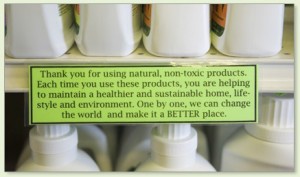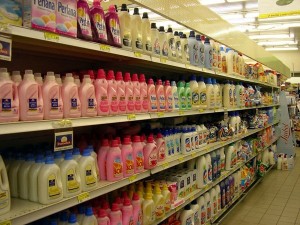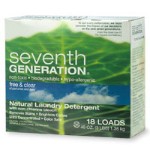Let’s face it – there’s a lot more bad stuff out there than good, products that either can harm you, the environment, or both. Last week we spoke on scented candle alternatives. Let’s take a look at eco-friendly laundry detergent alternatives this week.
Laundry Detergents – What to Watch Out For
Laundry detergents are comprised of a number of chemicals and compounds that won’t play nice with your ideal of green living. Surfactants, anti-redeposition agents, and enzymes are all present, and all can cause problems.
First of all, most of the above listed ingredients come from petroleum. Further, surfactant agents may help to destroy stain particles, but one such surfactant is nonionic nonylphenol ethoxylate, which is believed to be an endocrine disruptor that not only harms marine life, but may be behind the stimulation of breast cancer cells. The Sierra Club has already outlined the dangers of this chemical and are demanding the EPA conduct more research on it. Other surfactants often found in laundry detergents are carcinogenic and believed to play roles in kidney and liver cancer.
Laundry Detergent Product Alternatives
There are other choices than toxic, environmentally unfriendly laundry detergents. Soap is one. It works well on natural fabrics and can even leave some materials softer than traditional detergent can. Different fabrics require a different touch, however. Down or feathers should be handled with a mix of mild sop and baking soda, while wools and similar materials can be cleaned with a mixture of mild soap or protein shampoos.
Baking soda specifically can be used to keep clothes soft and smelling spiffy – around a half a cup of the substance should do the trick. Keep in mind that a cup of vinegar added to the wash cycle can retain color brightness, although NEVER mix vinegar with bleach, or risk some nasty, unhealthy fumes as a result.
If you’re dealing with synthetic materials, turn away from typical store-bought laundry detergents and instead to biodegradable detergents that are available. These may only be found at health food stores, through mail service or online, but they don’t house phosphates or various other unfriendly chemicals, and are fragrance-free. Companies such as Ecos, Mountain Green and Seventh Generation all offer such alternatives.
Is Hot Water Necessary?
In a word, no. Hot water is not necessary in conjunction with detergents to wash your clothes. After all, the amazing sanitizing effects of hot water only occur when that water is boiling, anyway. Eighty percent of the energy used in the course of doing laundry is from heating the water, so why not conserve all of that? Unless you’re dealing with some hardcore stains, hot water isn’t necessary to getting the job done, and those stains can be pre-treated prior to the wash, anyway.
Newer washing machines and the advent of coldwater detergents make it entirely possible for you to handle both your whites and coloreds using only cold water, so keep this in mind. Foregoing the use of hot water will not only provide the desired energy reduction, but can save you as much as nearly $100 a year. Not a bad compromise, eh?
If you aren’t looking to buy laundry detergent alternatives and the above tips haven’t fit the bill, you can visit Women’s Voices for the Earth to find laundry detergent recipes as well as other home cleaning formulas.




Are these detergents very viable? Anyone use them yet?
nice article! nice site. you're in my rss feed now 😉
keep it up
this is my favourite blog now
What a useful post here. Very informative for me..TQ friends…
http://golfman.the-mnm.info
Is there any detergent for carpet?? Or can I use laundry detergent for carpet??
Thanks for sharing.Very informative article.
@ Steam There are some detergents available in markets particulary for carpets.